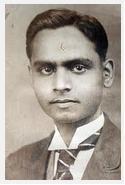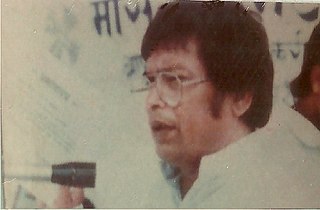Related Research Articles
Indian poetry and Indian literature in general, has a long history dating back to Vedic times. They were written in various Indian languages such as Vedic Sanskrit, Classical Sanskrit, Ancient Meitei, Modern Meitei, Telugu, Tamil, Odia, Maithili, Kannada, Bengali, Assamese, Hindi, Marathi and Urdu among other prominent languages. Poetry in foreign languages such as English also has a strong influence on Indian poetry. The poetry reflects diverse spiritual traditions within India. In particular, many Indian poets have been inspired by mystical experiences. Poetry is the oldest form of literature and has a rich written and oral tradition.
Marathi literature is the body of literature of Marathi, an Indo-Aryan language spoken mainly in the Indian state of Maharashtra and written in the Devanagari and Modi script.

Vishnu Vaman Shirwadkar, popularly known by his pen name, Kusumāgraj, was a Marathi poet, playwright, novelist and short story writer, who wrote of freedom, justice and emancipation of the deprived.

Arun Balkrishna Kolatkar was an Indian poet who wrote in both Marathi and English. His poems are known for expressing the humour in everyday life. Kolatkar is the only Indian poet other than Kabir to be featured on the World Classics titles of New York Review of Books.
Dilip Purushottam Chitre was one of the foremost Indian poets and critics to emerge in the post Independence India. Apart from being a notable bilingual writer, writing in Marathi and English, he was also a teacher, a painter, a filmmaker and a magazine columnist.

Bal Sitaram Mardhekar was a Marathi writer who brought about a radical shift of sensibility in Marathi poetry. He was born in a town called Faizpur in the Khandesh region of Maharashtra.
The little magazine movement originated in the 1950s and 1960s in many Indian languages like Bengali, Tamil, Marathi, Hindi, Malayalam and Gujarati, in the early part of the 20th century.
Marathi poetry is a poetry written in the Marathi language, including its various dialects.
Daya Pawar or Dagdu Maruti Pawar was an Indian Marathi language author and poet known for his contributions to Dalit literature that dealt with the atrocities experienced by the dalits or untouchables under the Hindu caste system. He was a Buddhist by religion.
Malika Amar Sheikh or Malika Namdeo Dhasal is a Marathi writer and political activist from Maharashtra, India. She is the president of the Dalit Panthers party.

Arun Krushnaji Kamble was an Indian Marathi language writer, professor, Politician, and Dalit activist. Arun Kamble, President and one of the founding members of Dalit Panthers of India, worked as a Head of Marathi department at University of Mumbai. He was the National General Secretary of Janata Dal. He took many major decisions in favour of Dalit, Backward Class and Minorities.

Baburao Ramji Bagul (1930–2008) was a Marathi writer from Maharashtra, India; a pioneer of modern literature in Marathi and an important figure in the Indian short story during the late 20th century, when it experienced a radical departure from the past, with the advent of Dalit writers such as him.
Pradnya Daya Pawar, also known as Pradnya Lokhande,, is an Indian poet and fiction writer of Marathi descent.
The Dalit Panthers is a social organisation that seeks to combat caste discrimination. It was led by a group of Mahar writers and poets, including Raja Dhale, Namdeo Dhasal, and J. V. Pawar in some time between the second and the third semester of 1972. It was founded as a response to the growing discontent among the Dalit youth during the 25th Independence Day celebrations. Inspired by the Black Panther movement in the United States, poet-writers J V Pawar and Namdeo Dhasal founded the Dalit Panthers, urging a boycott of the Independence Day revelry, terming it a 'Black Independence Day'. The movement's heyday lasted from the 1970s through the 1980s, and it was later joined by many Dalit-Buddhist activists.
Dalit literature is a genre of Indian writing that focuses on the lives, experiences, and struggles of the Dalit community, who have faced caste-based oppression and discrimination for centuries. This literature encompasses various Indian languages such as Marathi, Bangla, Hindi, Kannada, Punjabi, Sindhi, Odia and Tamil and includes diverse narratives like poems, short stories, and autobiographies. The movement originated in response to the caste-based social injustices in mid-twentieth-century independent India and has since spread across various Indian languages, critiquing caste practices and experimenting with different literary forms.

Rajaram Piraji Dhale, commonly referred to as Raja Dhale, was an Indian writer, artist and activist for Dalit rights. In April 1972, he, along with Namdeo Dhasal and J. V. Pawar, founded the Dalit Panthers, an organization dedicated to fighting for the rights of the Dalit community. Dhale was a veteran Ambedkarite and Buddhist.

Eleanor Zelliot was an American writer, professor of Carleton College and specialist on the India, Southeast Asia, Vietnam, women of Asia, Untouchables, and social movements.
Gangadhar Vithoba Pantawane was an Indian Marathi language writer, reviewer and Ambedkarite thinker from the state of Maharashtra. He was the follower of B. R. Ambedkar, polymath and the father of the Indian Constitution. He is one of the pioneers of the dalit literary movement in Maharashtra. In 2008, he was elected president of the first Marathi Vishwa Sahitya Sammelan that was held in the United States. His pioneering journal, Asmitadarsh, galvanised generations of Dalit writers and thinkers. In 2018, he was honored with the Padma Shri by the Government of India.
Namdeo Chandrabhan Kamble is an Indian Marathi-language writer, social worker, journalist and teacher. He was awarded the Sahitya Akademi Award in 1995 for his novel Raghav Vel. He was awarded Padma Shri in the field of literature and education in 2021.
Chandramohan Sathyanathan is an Indian poet. He resides in Thiruvananthapuram and has primarily been part of the contemporary Indian English poetry scene. He trained as an engineer. Chandramohan's poetry covers a range of themes, with a particular emphasis on issues related to caste discrimination, gender surveillance, and political activism. His poems often draw inspiration from historical events and contemporary movements, providing a unique perspective on the marginalized.
References
- ↑ "Padma Awards" (PDF). Ministry of Home Affairs, Government of India. 2015. Retrieved 21 July 2015.
- 1 2 3 "Voice of the oppressed". 7 February 2014. Archived from the original on 3 February 2014. Retrieved 11 June 2014.
- ↑ De, Ranjit Kumar; Shastree, Uttara (4 October 1996). Religious Converts in India: Socio-political Study of Neo-Buddhists. Mittal Publications. ISBN 9788170996293 – via Google Books.
- ↑ "International Literature Festival website – Namdeo Dhasal".
- ↑ "The Heart is a Lonely Woman - Malika Amar Sheikh". indianexpress.com. 26 November 2016. Retrieved 15 June 2020.
- ↑ Kuber, Girish (December 2006). "Dalit Fury : Blame it on Leaders". The Economic Times. Retrieved 18 January 2022.
- ↑ Subrahmaniam, Arundhati (1 December 2007). "Namdeo Dhasal (India, 1949)". Poetry International. Archived from the original on 10 October 2017. Retrieved 25 July 2017.
- ↑ "Namdeo Dhasal". www.ambedkar.org.
- ↑ Chitre, D. (tr.) (2006) Namdeo Dhasal: Poet of the Underworld, Poems 1972–2006, Navayana Publishing, New Delhi Archived 26 September 2013 at the Wayback Machine ISBN 81-89059-10-6
- ↑ 1 November 2004 Sahitya Akademi website.
- ↑ Namdeo Dhasal, a special Sahitya Akademi Golden Jubilee award Archived 26 December 2004 at the Wayback Machine The Hub -Tehelka, 23 October 2004.
- ↑ "Marathi poet Namdeo Dhasal dead". The Hindu. 16 January 2014. Retrieved 11 June 2014.